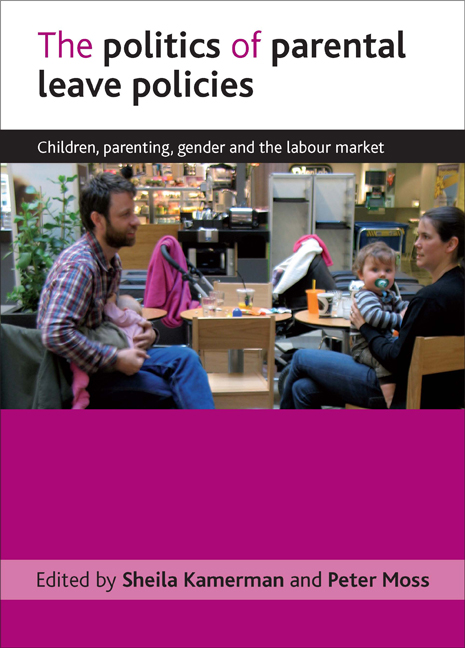Book contents
- Frontmatter
- Contents
- List of tables and figures
- Acknowledgements
- Notes on contributors
- one Introduction
- two Australia: the difficult birth of paid maternity leave
- three Canada and Québec: two policies, one country
- four Czech Republic: normative or choice-oriented system?
- five Estonia: halfway from the Soviet Union to the Nordic countries
- six Finland: negotiating tripartite compromises
- seven France: gender equality a pipe dream?
- eight Germany: taking a Nordic turn?
- nine Hungary and Slovenia: long leave or short?
- ten Iceland: from reluctance to fast-track engineering
- eleven The Netherlands: bridging labour and care
- twelve Norway: the making of the father’s quota
- thirteen Portugal and Spain: two pathways in Southern Europe
- fourteen Sweden: individualisation or free choice in parental leave?
- fifteen The European directive: making supra-national parental leave policy
- sixteen Conclusion
- Appendix
- Index
nine - Hungary and Slovenia: long leave or short?
Published online by Cambridge University Press: 05 July 2022
- Frontmatter
- Contents
- List of tables and figures
- Acknowledgements
- Notes on contributors
- one Introduction
- two Australia: the difficult birth of paid maternity leave
- three Canada and Québec: two policies, one country
- four Czech Republic: normative or choice-oriented system?
- five Estonia: halfway from the Soviet Union to the Nordic countries
- six Finland: negotiating tripartite compromises
- seven France: gender equality a pipe dream?
- eight Germany: taking a Nordic turn?
- nine Hungary and Slovenia: long leave or short?
- ten Iceland: from reluctance to fast-track engineering
- eleven The Netherlands: bridging labour and care
- twelve Norway: the making of the father’s quota
- thirteen Portugal and Spain: two pathways in Southern Europe
- fourteen Sweden: individualisation or free choice in parental leave?
- fifteen The European directive: making supra-national parental leave policy
- sixteen Conclusion
- Appendix
- Index
Summary
Hungary
Maternity leave: 24 weeks at 70% of earnings, with no ceiling.
Paternity leave: 5 days at 100% with no ceiling.
Parental leave: until child is 3 years; a family entitlement. Paid at 70% of earnings until child is 2 years up to a ceiling of HUF96,600 (€320) per month, then a flat-rate payment of HUF28,500 (€95) per month. For uninsured parents, paid at flat rate for the whole period.
Leave to care for children: varies according to age of child from unlimited (for children under one year) to 14 days per family per year (6–12 years) at 70% of earnings.
Other: if there are 3 or more children, either parent may take leave between the third and eighth birthday of the youngest child, with a flat-rate payment of HUF28,500 (€95) per month. Paid breastfeeding breaks for mothers until child is 9 months.
Slovenia
Maternity leave: 105 calendar days (15 weeks) at 100% with no ceiling.
Paternity leave: 90 calendar days (13 weeks) at 100% of earnings for 15 days up to a ceiling of 2½ times national average earnings (approximately €3,430 per month); social security contributions paid for remaining period.
Parental leave: 260 calendar days (37 weeks) per family at 100% of earnings up to a ceiling of 2½ times national average earnings (approximately €3,431 per month). Extended by 30 days if there are already two children in the family under 8 years, by 60 days if three children, and by 90 days if four or more children of this age.
Leave to care for dependants: 7 working days per person per episode of illness (or 15 working days for a child under 7 years or with a disability) at 80% of earnings.
Other: paid breastfeeding breaks for mothers.
Hungary and Slovenia are member states of the European Union (EU). Slovenia gained independence in 1991 after being part of Yugoslavia. Hungary has a low level of employment among women with children under 3 years and a low level of part-time employment among women workers. It was a pioneer in the introduction of parental leave. There is no information on take-up, although it is estimated that most children under 3 years have a parent taking leave and that very few of these parents are fathers. There is a low level of formal childcare provision for children under 3 years.
- Type
- Chapter
- Information
- The Politics of Parental Leave PoliciesChildren, Parenting, Gender and the Labour Market, pp. 135 - 158Publisher: Bristol University PressPrint publication year: 2009
- 1
- Cited by



